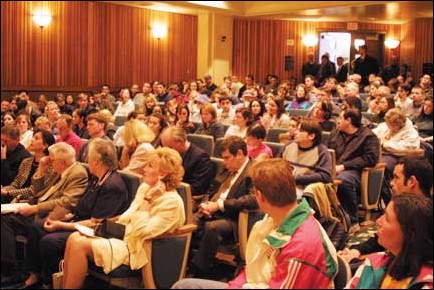Hungarian ambassador speaks at CSUS

Image: Hungarian ambassador speaks at CSUS:Photo by Matt SchrapState Hornet:
February 5, 2003
The Hungarian ambassador to the United States visited Sacramento State to spread sentiments of a strong trans-Atlantic relationship and hopes for peace in the Iraqi situation.
“There is no alternative to Europe and America holding hands,” said Ambassador Andras Simonyi to a gathering of over 200 students and instructors in Hinde Auditorium on Feb. 5. “We can not allow [Iraqi president Saddam] Hussein to drive a wedge between Europe and the U.S.”
Simonyi was appointed to the ambassadorship in 2002. He is a graduate of Budapest University with a Ph.D. in political science.From 1999 to 2001, Simonyi served as the first permanent Hungarian representative to the NATO (North Atlantic Treaty Organization) Council. He was instrumental in preparing Hungary’s accession to NATO in 1999, according to NATO’s official Web site.
Simonyi said the world’s biggest threat is terrorism.
“The attack on New York was an attack on all of us,” Simonyi said. “Terrorists want to tear the fabrics of our societies apart. We must face terrorism together. The worst thing we can do is hide.”
Simonyi made clear several times that Hungary would like the Iraqi conflict to be handled peacefully.
“We need to give peace the best chance we can,” Simonyi said. “If peace runs out, the international community will have to react.”
Hungary was one of the eight nations that recently signed a letter supporting President Bush’s policy on Iraq. The other seven nations whose leaders signed the letter include Great Britain, Spain, Italy, Portugal, Denmark, Poland, and the Czech Republic.France and Germany have been audible against military action against Iraq. Simonyi dispelled the notion of European disunity in the matter of Iraq.
“The letter forged unity against the brutal, harsh, terrible dictatorship in Iraq,” Simonyi said. “There can be no rift. We must hold hands in this.”
Simonyi also spoke harshly of the growing anti-American sentiment in Europe.
“Anti-Americanism is a cancer that can destroy the body we have created over the last 50 years,” Simonyi said. “[The sentiment] will go away if we face it and hold hands. We need to realize that Americans are more European than they realize, and Europeans are more American than they realize.”
























































































































